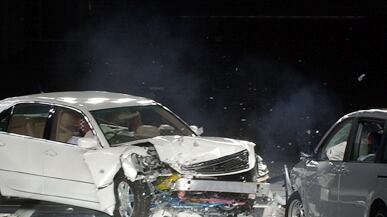In Oliver Stone's recent Wall Street sequel, Eli Wallach played a venerable investment banker who was asked about the trajectory of the 2008 financial crisis. He answered, "It'll get worse now because it'll go faster."
Nobody knows how fast a reputation can get sucked down the vortex better than Toyota. In the past year, the company has had its 75-year reputation for excellence severely compromised by a drumbeat of product safety allegations. Toyota recalled millions of cars at a cost of billions of dollars, and paid nearly $50 million in fines.
Now, a fresh indignity: Despite being vindicated last week by no less than NASA of the charge that electronic demons conjure Toyotas into Apollo rockets, safety advocates are again gunning for the company.
Carter-era auto activists Joan Claybrook and Clarence Ditlow are flying under the open-ended banners of They-Didn't-Look-Hard-Enough (NASA) and Unanswered Questions (Toyota).
I know the default argument: Watchdogs are a hedge against corporate malfeasance.
It's true, in theory.
But the abstraction is undermined by a terrifying reality: A new generation of corporate stalkers—I call them "crisis capitalists" because they are active investors in destruction, including plaintiff's lawyers, short sellers, journalists, government and non-government scolds and whistleblowers—has emerged that suffers no consequences for being wrong.
There are only rewards in the form of media attention, extortionate legal settlements, Pulitzer Prizes, and the sociopathic euphoria of seeing a cultural caterpillar burned alive under a magnifying glass.
God forbid any successful business be left unmolested. The destruction of a for-profit enterprise is always noble; its defense always carries the whiff of mendacity.
Crisis capitalists position their actions as searches for the truth. Not necessarily. In the mid-1980s, I played a small role in the notorious Audi 5000 crisis. That's when a tort lawyer-sponsored group called the Audi Victims Network alleged the Audi 5000 accelerated of its own volition.
The destruction of a for-profit enterprise is always noble; its defense always carries the whiff of mendacity.

Audi struggled clumsily with alternative responses. When a company spokesperson suggested that many of the accidents were due to driver error, outrage followed, and the Audi brand was decimated in the U.S. for more than a decade.
Years later, the company was vindicated after it became clear that driver error caused most of the accidents. The woman who launched the crisis on 60 Minutes ended up admitting her foot was on the accelerator when her car ran over her small boy.
Audi discovered that not only will the truth not set you free, it may actually destroy you. While Toyota was somewhat more careful with its suspicions of driver error, even its hint of this possibility was met with fury despite being materially true.
No mechanism exists to check, delay, or halt the downward spinning of the crisis vortex. In the Digital Age, there are only accelerants.
The First Amendment, libel laws, and the rise of WikiLeaks ensure that Toyota-style attacks on businesses will continue unabated.
WikiLeaks founder Julian Assange has stated that businesses are his next target and that his modus operandi is "Pain for the guilty." If you're a corporation, consider yourself convicted.
Leaks intrinsically carry the proxy of authority. If it was leaked, the logic goes, it's EXPLOSIVE.
This syndrome is aggravated by a legal system that now offers incentives to whistleblowers that would make Goldman Sachs blush. In a recent case, one Big Pharma whistleblower personally received nearly $100 million for alleging misdeeds at a major company—despite no evidence that there had been any injuries.
Is there an antidote?
Take the case of homebuilder Lennar Corp. After losing 20 percent of its market value after fraud-buster (and former swindler-turned-pastor) Barry Minkow leveled a variety of charges against Lennar, the company sued Minkow for libel and extortion. A Miami judge ruled against Minkow, who had been shorting Lennar stock, saying that he had given false testimony, destroyed evidence, and concealed key witnesses. The judge denied Minkow a jury trial and ordered him to pay huge sanctions, money that Lennar will likely never see.
It's a start.
No question, there are villains among us, and some of them are prominent businesspeople and corporations. Left unsupervised, some will behave badly. Scrutiny and punishment are legitimate safeguards.
Nevertheless, there are other villains among us who are also dangerous because they operate behind a mantle of virtue and within a shadow system that is as unchecked as the one they attack. The apparatus works its mayhem sprinkled with the Holy Water of transparency and consequences.
Fine, but if crisis capitalists really want transparency and consequences, these principles have to go two ways. So let's bring the following phenomena out into the sunlight:
• The relationship between short sellers and the journalists who assist them in driving down the price of stocks; • Links between plaintiff's lawyers and NGOs that secretly fund "independent" studies concluding that certain products are public hazards; • The tightly knit cadre of legislators and journalists who traffic in scare studies in order to pollute jury pools and facilitate huge settlements; • The economic damage done to companies, employees, and communities when a dubious attack catches on; • The hidden agendas of media pundits who facilitate Toyota-style feeding frenzies; • The huge gap between the publicity with which an enterprise is accused and eventually vindicated; • The crimes committed to steal and forge documents that become part of the public record and are accepted as proof of malfeasance; • The reevaluation of defamation law in the wake of risk-free Internet media outlets and leak portals.
Will such a reexamination ever happen? Perhaps in sporadic fits and starts. There is neither media nor public interest in corporate vindications. In America, we decided long ago that the risks of curtailing free speech outweigh the benefits. In the insatiable Information Age, we demand more data, even if it's wrong.
Only those who have been burned will push back, and even they will do so reluctantly because of the punishing resources required. By the time a defense can be mounted, the vortex has already done its damage.
Still, the same proliferation of media that has abetted crisis capitalists also provides an opportunity for fighting back. Just don't expect high fives at your neighborhood barbecue for defending poor, misunderstood multinational corporations.
Eric Dezenhall co-founded the communications firm Dezenhall Resources Ltd. and serves as its CEO. His first book, Nail 'em!: Confronting High-Profile Attacks on Celebrities and Business, pioneered techniques for understanding and defusing crises.






